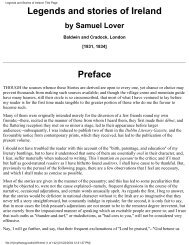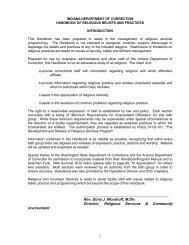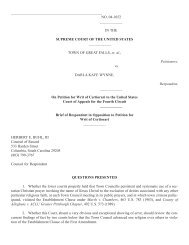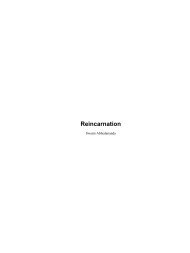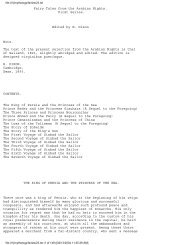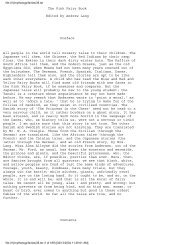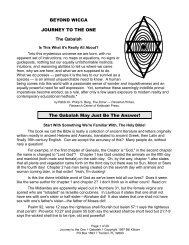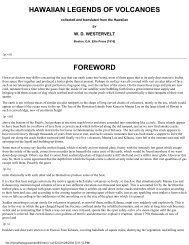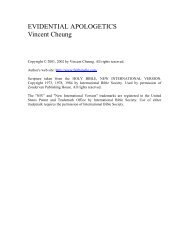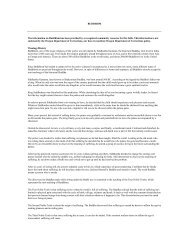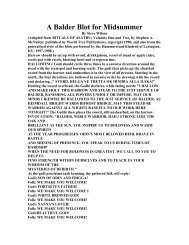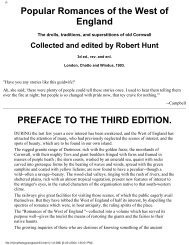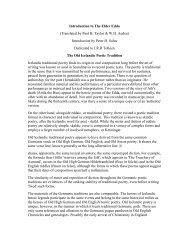Irish Druids And Old Irish Religions PREFACE CONTENTS
Irish Druids And Old Irish Religions PREFACE CONTENTS
Irish Druids And Old Irish Religions PREFACE CONTENTS
Create successful ePaper yourself
Turn your PDF publications into a flip-book with our unique Google optimized e-Paper software.
had certain lands which were attached to the office. The successors of this important class are the Sheriffs of counties."<br />
The learned John Toland, born in Londonderry, 1670, who was a genuine patriot in his day, believed in his country's <strong>Druids</strong>. In the<br />
Hebrides, also, he found harpers by profession, and evidence of ancient Greek visitants. In Dublin he observed the confidence in augury<br />
by ravens. He contended that when the Ancients spoke of Britain as Druidical, they included Ireland; for Ptolemy knew Erin as Little<br />
Britain. He recognized <strong>Druids</strong>' houses still standing, and the heathen practices remaining in his country.<br />
"In Ireland," said he of the <strong>Druids</strong>, "they had the privilege of wearing six colours in their Breacans or robes, which are the striped Braceæ<br />
of the Gauls, still worn by the Highlanders, whereas the king and queen might have in theirs but seven, lords and ladies five," &c. He had<br />
no doubts of their sun-worship, and of Abaris, the Druid friend of Pythagoras, being from his own quarters. While he thought the Greeks<br />
borrowed from the northern <strong>Druids</strong>, he admitted that both may have learned from the older Egyptians.<br />
Rhys, as a wise and prudent man, is not willing to abandon the <strong>Druids</strong> because of the absurd and most Positive announcements of<br />
enthusiastic advocates; since he says, "I for one am quite prepared to believe in a<br />
p. 22<br />
Druidic residue, after you have stripped all that is mediæval and Biblical from the poems of Taliesin. The same with Merlin." <strong>And</strong> others<br />
will echo that sentiment in relation to <strong>Irish</strong> Druidism, notwithstanding the wild assumptions of some writers, and the cynical unbelief of<br />
others. After all eliminations, there is still a substantial residue.<br />
One may learn a lesson from the story told of Tom Moore. When first shown old <strong>Irish</strong> MSS., he was much moved, and exclaimed, "These<br />
could not have been written by fools. I never knew anything about them before, and I had no right to have undertaken the History of<br />
Ireland."<br />
An old <strong>Irish</strong> poem runs:--<br />
"Seven years your right, under a flagstone in a quagmire,<br />
Without food, without taste, but the thirst you ever torturing,<br />
The law of the judges your lesson, and prayer your language;<br />
<strong>And</strong> if you like to return<br />
You will be, for a time, a Druid, perhaps."<br />
Druid Houses, like those of St. Kilda, Borera Isle, &c., have become in more modern days Oratories of Christian hermits. They are arched,<br />
conical, stone structures, with a hole at the top for smoke escape. Toland calls them "little arch'd, round, stone buildings, capable only of<br />
holding one person." They were known as Tighthe nan Druidhneach. There is generally in many no cement. The so-called Oratory of St.<br />
Kevin, 23 ft. by 10 and 16 high, has its door to the west. The writer was supported by the Guide at Glendalough, in the opinion of the great<br />
antiquity of St. Kevin's Kitchen. The house at Dundalk is still a place of pilgrimage.<br />
The one at Gallerus, Kerry, has a semi-circular window. Of these oratories, so called, Wise observes, "They were not Christian, but were<br />
erected in connection with this early, let us call it, Celtic religion. If they had been Christian, they would have had an altar and other<br />
Christian emblems, of which, however, they show no trace. If they had been<br />
p. 23<br />
Christian, they would have stood east and west, and have had openings in those directions.--The walls always converged as they rose in<br />
height."<br />
<strong>Irish</strong> <strong>Druids</strong> lived before the advent of Socialism. They appear to have had the adjudication of the law, but, as ecclesiastics, they delivered<br />
the offenders to the secular arm for punishment. Their holy hands were not to be defiled with blood. The law, known as the Brehon Law,<br />
then administered, was not socialistic. <strong>Irish</strong> law was by no means democratic, and was, for that reason, ever preferred to English law by<br />
the Norman and English chieftains going to Ireland. The old contests between the <strong>Irish</strong> and the Crown lay between those gentlemen-rulers<br />
and their nominal sovereign. So, in ancient times, the <strong>Druids</strong> supported that Law which favoured the rich at the expense of the poor. They<br />
were not Socialists.<br />
They were, however, what we should call Spiritualists, though that term may now embrace people of varied types. They could do no less<br />
wonderful things than those claimed to have been done by Mahatmas or modern Mediums. They could see ghosts, if not raise them. They<br />
could listen to them, and talk with them; though unable to take photos of spirits, or utilize them for commercial intelligence.<br />
It would be interesting to know if these seers of Ireland regarded the ghosts with an imaginative or a scientific eye. Could they have<br />
investigated the phenomena, with a view to gain a solution of the mysteries around them? It is as easy to call a Druid a deceiver, as a<br />
politician a traitor, a scientist a charlatan, a saint a hypocrite.<br />
As the early days of <strong>Irish</strong> Christianity were by no means either cultured or philosophical, and almost all our knowledge of <strong>Druids</strong> comes<br />
from men who accepted what<br />
p. 24<br />
would now only excite our derision or pity, particularly indulging the miraculous, we are not likely to know to what class of modern<br />
file:///I|/mythology/witchcraft/8/8.html (10 of 114) [02/05/2004 8:38:13 AM]



